|
|
|
Sort Order |
|
|
|
Items / Page
|
|
|
|
|
|
|
| Srl | Item |
| 1 |
ID:
099454
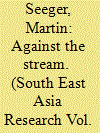

|
|
|
|
|
| Publication |
2010.
|
| Summary/Abstract |
Both Thai and Western academia have recently paid increasing attention to the changing roles of Thai Buddhist women. Still conspicuously missing, however, are more in-depth studies of female Buddhist saints in Thailand and the attendant symbolism, which would provide a more adequate depiction of the contemporary Thai Buddhist landscape. Similar to the prominent role of the mae chi in monastic education, the emergence of hagiographies and the veneration of female Buddhist saints has not, to date, been given sufficient attention in academic studies. To help remedy this situation, this paper provides a life account of one of the most outstanding female practitioners of modern Thai Buddhism: Mae Chi Kaew Sianglam (1901-1991). A summary of an increasing number of available biographical materials on Mae Chi Kaew's life is followed by a thematic analysis in which the author examines various aspects of her life accounts and her veneration. The purpose is to study the enormous significance of Mae Chi Kaew's biographies and attendant symbolic representations in the context of the religious landscape of Thai Buddhism. The author shows that many hagiographical elements in the sacred biographies of Mae Chi Kaew approximate the hagiographical paradigms not only of the Buddha and other Pali canonical figures, but also of modern saints of the Thai forest tradition. At the same time, however, significant hagiographical and venerational particularities can be observed.
|
|
|
|
|
|
|
|
|
|
|
|
|
|
|
|
| 2 |
ID:
099448
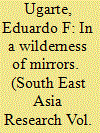

|
|
|
|
|
| Publication |
2010.
|
| Summary/Abstract |
Most media coverage of the 'Abu Sayyaf', an allegedly militant Islamist group or organization in the Philippines, derives ultimately from official sources, but the information provided by such sources has never been subject to scrutiny. To redress the oversight, this paper critically examines official and media accounts of the 'Abu Sayyaf'. Beginning with a survey of media reports from June 2007 to January 2009, it highlights the contradictions uncovered in the sample before accounting for such inconsistencies and other peculiarities in terms of Edward Herman and Noam Chomsky's propaganda model. Applying the model to the performance of the media in the southwestern Philippines, the paper then looks at the factors that render journalists in the region highly dependent on official sources for data, and hence vulnerable to state disinformation, before exploring the framework of presuppositions that influence popular representations of the 'Abu Sayyaf' and the troubles in the zone.
|
|
|
|
|
|
|
|
|
|
|
|
|
|
|
|
| 3 |
ID:
099453
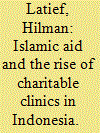

|
|
|
|
|
| Publication |
2010.
|
| Summary/Abstract |
By exploring Islamic charitable clinics in Indonesia, this paper shows how community-based initiatives and zakat [Islamic charitable obligation] agencies have provided wider access to viable health services for destitute families in poor urban and rural areas. Zakat agencies, with their charitable clinics, have recently gained strong support from both society and the government. They have, for example, tried to bring a community response to the current social economic challenges through the revitalization of the zakat and Islamic charity practice. Low-priced, accessible and free medical assistance for poorer families and small economic enterprises provided by the zakat agencies reflect the endeavours of middle class Indonesian Muslims to translate Islamic discourse on social welfare in a more concrete way. The rise of Islamic charitable clinics, whose origins and motives can partly be linked to the Islamic discourse of the welfare of the ummah [the Islamic community], is without doubt a consequence of emerging interpretations of the meaning and function of Islamic aid in contemporary Indonesian Islam.
|
|
|
|
|
|
|
|
|
|
|
|
|
|
|
|
| 4 |
ID:
099450
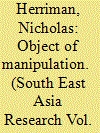

|
|
|
|
|
| Publication |
2010.
|
| Summary/Abstract |
Some of the most important contributors to the study of Indonesia have observed that the concept of 'rakyat' [the people] has been central to the way Indonesians understand their nation. 1 Yet until now there has been little attempt to consolidate and build on these observations by analysing the nuances and implications of understandings of the term 'rakyat'. In this paper, the author encourages the development of such research by critiquing its use in the period following the Second World War. The author analyses two key novels written by leading authors from opposing sides of a great cultural debate and shows that, regardless of the spiteful divide between left-wing and right-wing, the two authors viewed the rakyat as somewhat inferior. The rakyat was also seen as belonging to the village, but could transform into a violent yet manipulable throng in the city. Despite these pejorative implications, however, the rakyat was also key to the nation's aspirations. The author situates these developments in relation to a longer history of the term 'rakyat'.
|
|
|
|
|
|
|
|
|
|
|
|
|
|
|
|
| 5 |
ID:
099449


|
|
|
|
|
| Publication |
2010.
|
| Summary/Abstract |
What explains the recent internal territorial changes in the Indonesian archipelago? Given the relatively constant number of provinces and districts during the New Order period, the sudden rise of new districts and provinces in post-authoritarian Indonesia is puzzling. This article argues that the phenomenon is driven by multilevel alliances across different territorial administrative levels, or territorial coalitions. It suggests that national level institutional changes explain the timing of provincial proliferation and that the triggers can vary, depending on historical and cultural contexts.
|
|
|
|
|
|
|
|
|
|
|
|
|
|
|
|
| 6 |
ID:
099451
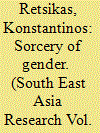

|
|
|
|
|
| Publication |
2010.
|
| Summary/Abstract |
Drawing on ethnographic material from East Java, Indonesia, this article examines the intersections of sorcery and gender and suggests that sorcery is a form of exchange, which, as well as inducing misfortune, pain and death, evinces gender. Key here are the invocation and inversion of marriage transactions and wedding rituals, and an underlying conception of the person as inherently androgynous. The article also calls for sorcery and other manifestations of violence to be moved away from the margins and towards the centre of anthropological descriptions of Javanese sociality.
|
|
|
|
|
|
|
|
|
|
|
|
|
|
|
|
|
|
|
|
|